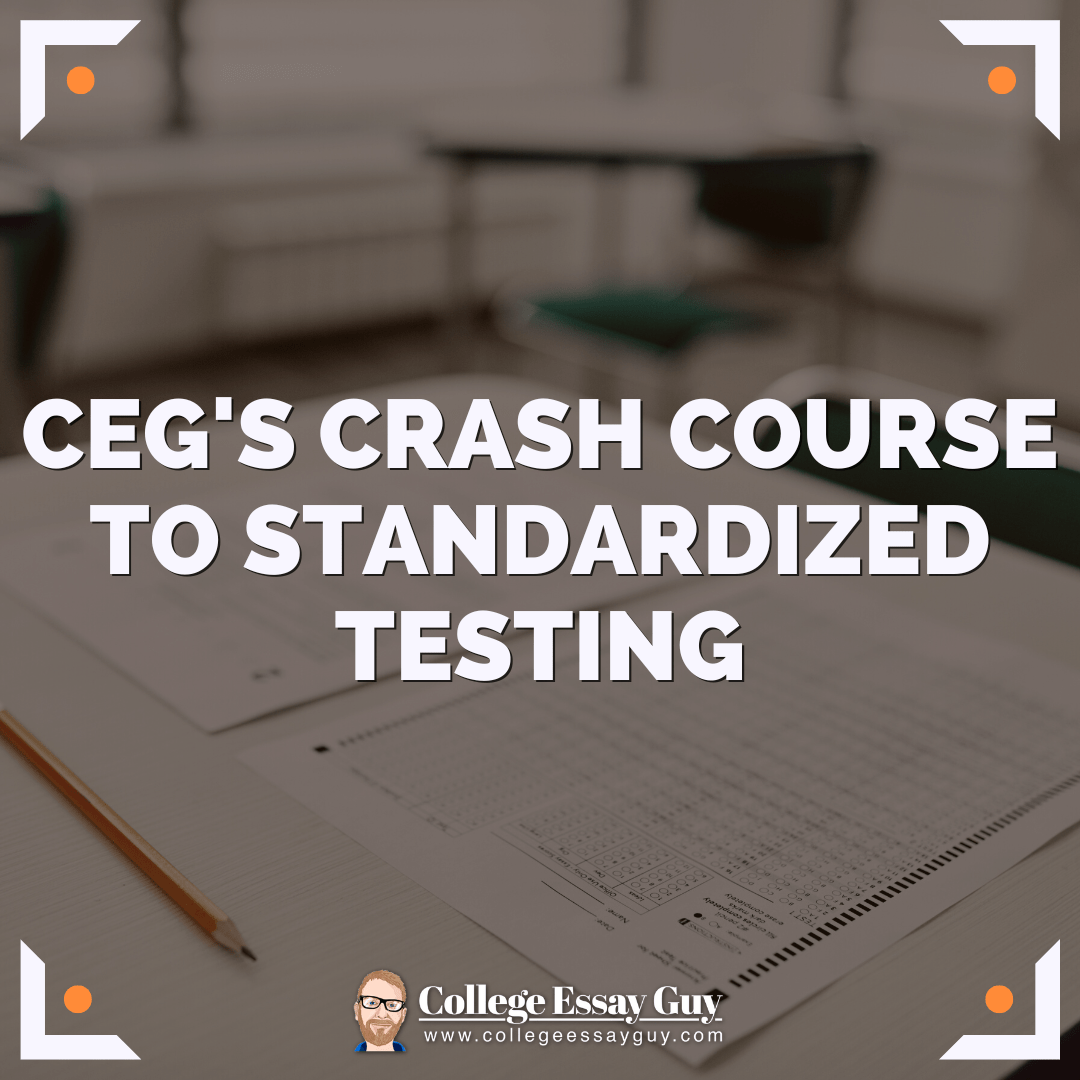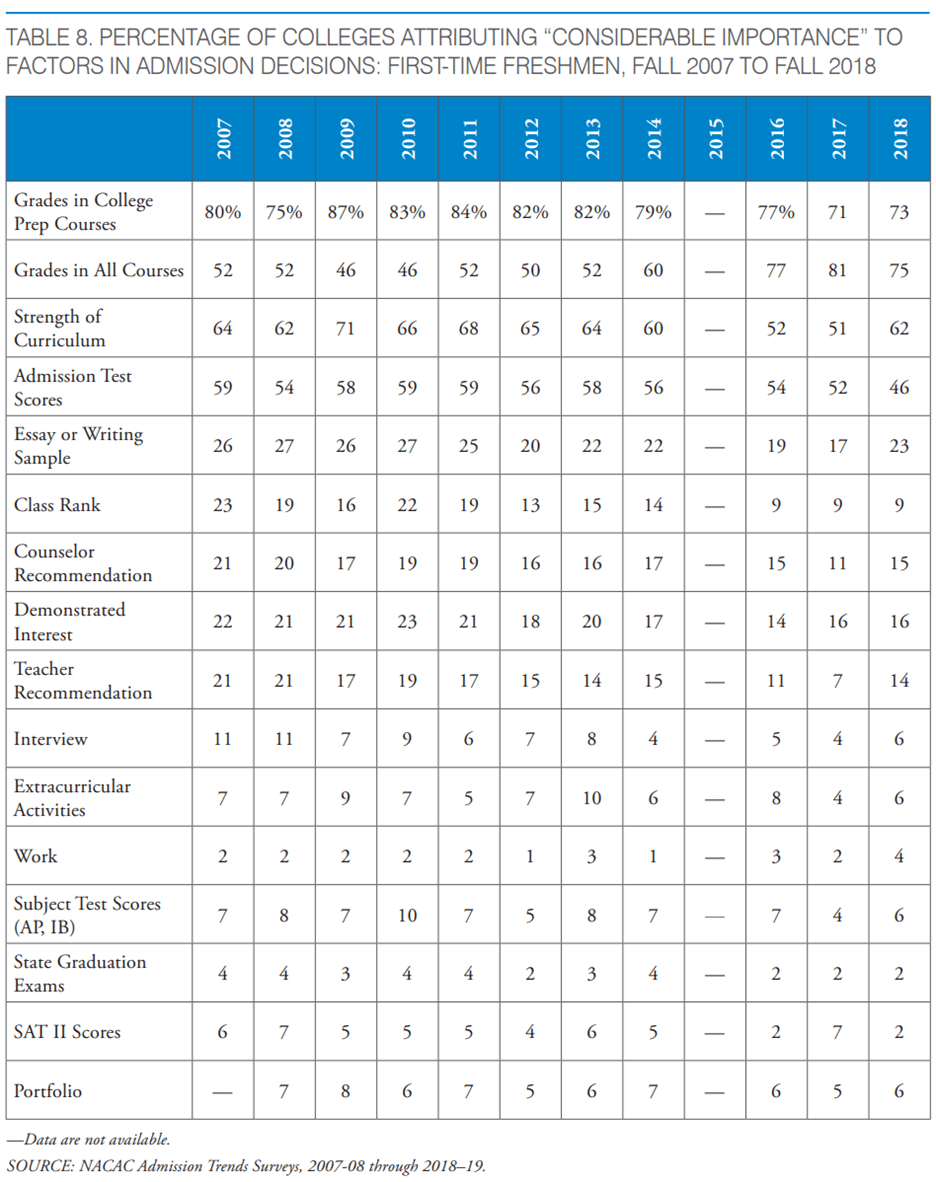Hi there.
We assume you’re here because you have standardized testing questions.
Great.
Here are some answers. Enjoy.
TABLE OF CONTENTS
(click to skip ahead)- Defining terms: What’s the difference between “test optional” and “test blind/free”?
- How can students find out what a “good score” is?
- How much do standardized tests matter for colleges?
- If I (as a student) test, what's the right test for me, ACT vs SAT?
- Let’s talk timelines: How much preparation should I plan on? And over what period of time?
- How should I prep for the SAT or ACT?
- How do the PSAT and the National Merit Scholarship play into all of this?
- How about APs?
Defining terms: What’s the difference between “test optional” and “test blind/free”?
We have a full guide here, including things like how to think through whether to submit scores to test optional schools, but the basic difference is …
Test optional
Students do not have to submit SAT or ACT test scores as part of the application for admission. Students themselves can choose whether or not to submit scores, and deciding not to submit a score does not negatively reflect on the student’s application.
Test blind/free
When a school is test blind (sometimes called test free), it means the schools will not consider student test scores under any circumstance. Students are still free to submit the scores, but the scores will not be considered as part of their application.
Does test optional really mean test optional?
Yes, but you might still need to submit test scores for things like scholarships (for example, many institutional scholarships require a test score).
How can students find out what a “good score” is?
Again, we have a full guide to what a “good” score is here, but here’s the quick version:
Use the school’s Common Data Set to find out their applicants’ score percentiles. (Side note: here’s a guide on different ways to use the Common Data Set in your application process.)
For example, here’s Stanford’s Common Data Set from 2021/22. 25% of its applicants (who submitted scores—Stanford has been test optional) scored a 1560+ on the SAT and a 35 composite on the ACT. 75% of applicants scored 1470+ or a 34. So if you wanted to apply to Stanford, and your scores were below those … submitting test scores probably doesn’t help your chances.
How much do standardized tests matter for colleges?
There are some caveats to this data, but glance at this chart real quick (image/data source here):
NACAC 2023 Admissions Factors Report
So that’s 30.3% placing either “considerable” or “moderate” importance on standardized test scores.
But a heads up that there has generally been a downward trend in test scores importance (even before the COVID disruption):
Should I test? And If I (as a student) test, what's the right test for me, ACT vs SAT?
If you’re wondering whether you should test, check out this webinar with Akil Bello, a respected test prep and college admissions expert. (Akil and Ethan get into a ton of stuff about testing, and that’s one big question they discuss how to think about.)
We have a guide that gets into detail on ACT vs SAT right here, but the short answer is, “it depends.”
For example, those seeking to receive a National Merit Scholarship will have to earn a competitive score on the PSAT. If you’re already going for such a scholarship, it makes sense to focus on the SAT. And while most major scholarships will take either ACT or SAT scores, it’s important to check the fine print on these scholarships well ahead of time to determine which test you should take.
We recommend that you take free practice tests for both the SAT and ACT to see if one seems easier to you and plays more to your strengths.
Let’s talk timelines: How much preparation should I plan on? And over what period of time?
This college application timeline gets into detail on way more than just test prep … but it also includes that.
Some key details:
9th grade:
(maybe) PSAT: Some high schools allow you to take the October PSAT as a freshman.
10th grade:
(maybe) PSAT: Some high schools allow you to take the October PSAT as a sophomore.
If you're taking an AP class this year, consider sitting for the AP exam (May). If you're concerned about your readiness, check in with your teacher for advice.
At the end of the school year, take a practice ACT and SAT to determine which test may be better for you (and see ACT vs SAT above), then set up a testing timeline.
11th grade:
Take the PSAT/NSMQT in October. This test qualifies students for the National Merit Scholarship.
Stay on track with your ACT/SAT testing timeline and study schedule.
Select testing dates. Most likely your first ACT or SAT will take place between December and May.
Take the AP/IB exams in May.
12th grade:
Maybe: test again in the autumn of senior year.
In the autumn, send test scores to your colleges after checking whether they allow self-reported scores.
In May, take AP/IB exams.
How should I prep for the SAT or ACT?
We have guides on:
You can also find free practice tests at ACT.org .
For the SAT, the College Board website provides free sample questions, sample tests (complete with detailed answer keys), and other valuable info (including info on important registration dates) via its website.
And Khan Academy has free SAT practice testing and, while not offering explicit ACT tests, offers free lessons on areas the ACT tests on.
How do the PSAT and the National Merit Scholarship play into all of this?
You’re probably shocked that we have full guides on both the PSAT and the National Merit Scholarship.
Or maybe not at this point.
Either way, as usual, here are the basics:
The PSAT (as in, Preliminary SAT) is what can qualify you for the National Merit Scholarship—if you earn a score in the top 1% of your state, you are eligible for.
There are four types of National Merit Scholarships (more on these in the guide above):
National Merit $2500 Scholarships
National Merit Special Scholarships
Corporate-sponsored Merit Scholarship awards
College-sponsored Merit Scholarship awards.
Important heads up: colleges don’t care about PSAT scores. Cause they don’t even see your PSAT scores.
So please don’t stress out about this test too much?
How about APs?
If you’re a bit unclear on what AP classes are, check out that guide.
And because students frequently ask things like “What are the easiest AP classes?” (and what are the hardest AP classes), we have guides to both, but a big heads up:
The answer to both of these questions is a huge “It really depends.” Those guides get into more detail about ways to think about “easy” and “hard” APs.
If you’re wondering about IB vs AP, we’ve got you covered there too.
Special thanks to Andy Simpson for writing this blog post.
Andrew Simpson, CEG’s Editorial Director, has worked as an educator, consultant, and curriculum writer for the past 15 years, and earned degrees from Stanford in Political Science and Drama. He feels most at home on mountain tops and in oceans.
Top Values: Insight/Growth | Truth | Integrity












